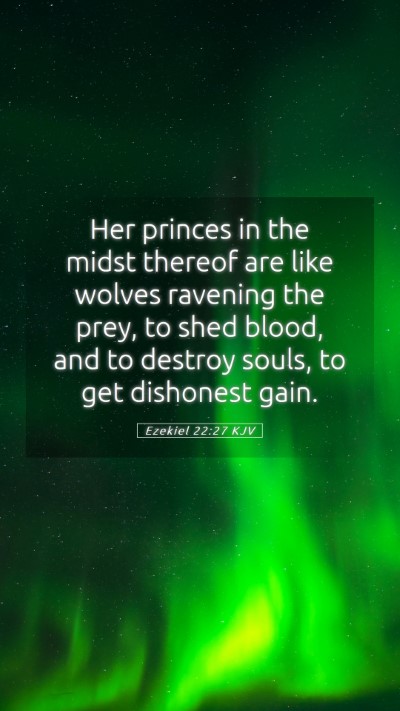Ezekiel 22:27 - Understanding the Message
Bible Verse: Ezekiel 22:27 (NIV) - "Her officials within her are like wolves tearing their prey; they shed blood and kill people to make unjust gain."
This verse illustrates the moral decay and corruption prevalent among the leaders of Jerusalem. The prophet Ezekiel uses vivid imagery to depict the brutality and greed of the officials, likening them to wolves that prey on the defenseless. This condemnation reveals the deep-seated injustices within the society, emphasizing the need for spiritual and ethical reform.
Context of Ezekiel 22
The book of Ezekiel addresses the Israelites during their Babylonian exile. The prophecies often focus on the judgment of God due to the sins of the people, particularly their leaders. In chapter 22, Ezekiel specifically calls out various sins, including violence, oppression, and idolatry, demonstrating how leaders failed in their responsibilities.
Commentary Analysis
- Matthew Henry: Henry emphasizes the role of leadership in society, highlighting that when leaders are corrupt and predatory, the entire community suffers. He stresses the moral obligation of leaders to protect and provide justice to their people, contrasting this expectation with the reality of the officials’ actions.
- Albert Barnes: Barnes discusses the metaphor of wolves as indicative of ravenous and unscrupulous leaders. He notes that their actions symbolize a broader societal issue where greed overwhelms justice, leading to widespread violence and injustice. Barnes connects this understanding to the consequences of societal decay where leaders exploit their power.
- Adam Clarke: Clarke provides insights on the historical context of the verse, indicating that the officials' actions were not merely personal failings but reflections of systemic corruption. He argues that Ezekiel's prophecy serves as a warning regarding the consequences of failing to uphold righteousness and justice.
Key Themes
Several important themes emerge from Ezekiel 22:27 that are relevant for Bible verse understanding:
- The Danger of Corrupt Leadership: This verse serves as a cautionary reminder about the effects of corrupt leaders, underscoring the need for accountability and integrity in positions of power.
- Justice and Injustice: The imagery of wolves highlights the stark contrast between justice and injustice. Reflecting on this theme prompts contemplation about our contemporary political and social systems and their alignment with moral principles.
- Societal Responsibility: The verse reflects on the collective responsibility of a society to uphold justice. It challenges individuals to consider their roles in promoting ethical standards in their communities.
Application of Biblical Exegesis
Understanding this verse is essential for applying biblical teachings to daily life. Here are some insights for personal reflection:
- Assess the integrity of those in authority roles in your community or workplace. Consider how you can advocate for ethical practices.
- Reflect on your own responsibilities in promoting justice and opposing corruption, whether in personal relationships or broader social issues.
- Engage in discussions with Bible study groups to explore themes of justice and integrity within the context of modern society.
Cross References
This verse can be linked to several other biblical passages that highlight similar themes:
- Isaiah 56:10-11: Describes watchmen who are blind and ignorant, akin to corrupt leaders.
- Jeremiah 23:1-4: A warning against shepherds who mislead and destroy the flock.
- Micah 3:1-3: Condemns rulers who hate good and love evil, tearing the flesh of their people.
Conclusion
The message of Ezekiel 22:27 serves as a timeless reminder of the weighty responsibility borne by leaders and the societal implications of their actions. Through careful Bible verse interpretations and study, believers can deepen their understanding of Scripture and its applications, cultivating a commitment to justice and ethical leadership in all areas of life.


